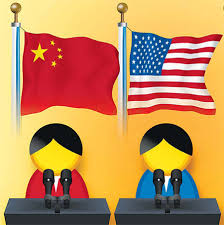
U-Turn in Sino-U.S. Relations
The Sino-U.S. relationship has been extremely tense since the beginning of the year and this tension is attributed to the never-ending interference of the Obama administration and lobbyists in Congress. Besides the U.S. surpassing the previous number of arms it sold to Taiwan, President Obama stubbornly met with the Dalai Lama, exerted pressure regarding RMB appreciation, exaggerated the impact of Google’s withdrawal from China and threatened sanctioning China for controlling its currency. All of this created an overall hostile environment, initiating a conflict and setting the stage for a trade war with China.
On the other hand, China is well prepared for the worst. Obviously, Obama and his Democratic government thoroughly understand that a conflict with China and a trade war between the two nations would only result in a lose-lose situation, in which the U.S. may suffer even more. Obama and his government understand that putting the conflict to an end at the appropriate time and reconciliation would lead to a win-win situation.
Obama Takes the Initiative to Resolve Conflict
To be honest, the strong criticism of China by the Obama administration and attacks on China’s core interests are interim measures. Facing the midterm election crisis, falling support in opinion polls and obstacles in passing health care reform, which Obama deems to be more important than re-election, the Chinese conflict is the only issue that can divert national focus away from these domestic issues. This transitional move, motivated by internal policy demands, has been effective. After the health care reform bill was finally approved, Obama was relieved and subsequently started to resolve the extremely strained Sino-U.S. relationship.
On March 29, when President Obama met with the new Chinese ambassador, Zhang Yesui, he reiterated the One-China policy, demonstrating his determination to foster a "positive, practical and cooperative relationship" with China. Subsequently, White House press secretary Robert Gibbs declared the U.S.' recognition of Taiwan and Tibet as integral parts of China. President Obama supported the effort to reduce conflict between Beijing and Taipei.
On April 2, President Obama took the initiative to call President Hu Jintao, talking for over an hour, to reiterate America’s consistency on the One-China policy and to continue to recognize this as China’s core interest. At the same time, Secretary of State Hillary Clinton, Treasury Secretary Timothy Geithner and Deputy Secretary of State James Steinberg all delivered speeches, one after the other, in attempts to reconcile with China. The Treasury Department has decided not to list China as a currency-manipulating country and Timothy Geithner declared on April 3 that the U.S. government would postpone the decision on whether to list China as a currency manipulator. The Defense Department has also decided to delay the issuance of a report about China’s military. All of this reveals that the Obama administration is determined to improve the Sino-U.S. relationship and, furthermore, to develop a "more comprehensive, cooperative relationship."
Of course, as Obama said, the Sino-U.S. relationship is the most crucial development in the 21st century. Positive collaboration is important to both nations, as well as to the whole world. The healthy development of a stable Sino-U.S. relationship is strategically important to both countries. In today’s world, any issue relating to the global economy, politics, security, climate change, anti-terrorism, prevention of nuclear proliferation and energy problems,, cannot be resolved without the involvement of China. For instance, China may refuse to attend the upcoming Nuclear Security Summit in Washington, D.C., to be held on April 12-13 due to the extremely tense relationship, as China is worried that the U.S. may list it as a currency-manipulating nation. In order to meet with President Hu Jintao, President Obama has decided to make amends with China at this critical moment.
China’s Friendly Response
China is the victim in this strained Sino-U.S. relationship. China, like the U.S., is reluctant to jeopardize the relationship. Furthermore, it does not want to jeopardize the recovery of the world economy or the world’s peace and security. Therefore, China responded promptly to the U.S.’ reconciliation in a cooperative manner, in order to repair the highly tense relationship.
On March 30, in light of Obama's determination to keep promises for a positive relationship, China immediately responded positively. Not only did China tone down its hostile attitude toward the U.S., but it proactively responded to U.S. demands and agreed to attend the U.S.-led summit and discuss new measures for sanctions against Iran. Moreover, after learning that the U.S. Treasury Department will not list China as a currency-manipulating nation, it immediately announced that President Hu Jintao would attend the Nuclear Security Summit in Washington, D.C. This delighted Obama, who then initiated a long telephone call with President Hu. Both countries further contribute to the now improving Sino-U.S. relationship.
More importantly, the U.S. has been hoping that China will, and continues to persuade China to, shoulder more global responsibilities. In this matter, President Hu has positively responded that both the U.S. and China have a significant impact on the world. Both shoulder the important responsibilities of engineering the world’s economic recovery and healthy development, sustaining growth, resolving international and regional issues, and maintaining world peace and security. In response to the Nuclear Security Summit, President Hu has firmly expressed that China would coordinate with the U.S. and endeavor for great achievements at this summit.
It is also apparent that China will decide in the near future to allow RMB appreciation at around 5 percent, and even 10 percent within this year. This is a friendly reply to the U.S.' strong urging of RMB appreciation, and is also a necessary measure against the rising inflationary pressure within China.
It is optimistic to predict that the Sino-U.S. relationship is developing in a stable and mature direction, despite the fact that unavoidable conflicts will still occur between the two nations.
